![[- NC State University -]](https://report.isa.ncsu.edu/Survey/Images/ban_logo.gif)
North Carolina State University
1998 Graduating Senior Survey:
Services for Students
![[- NC State University -]](https://report.isa.ncsu.edu/Survey/Images/ban_logo.gif)
North Carolina State University
1998 Graduating Senior Survey:
Services for Students
This report presents selected results from NC State�s 1998 Graduating Senior Survey. NC State offers a wide variety of university services to students, including academic advising, employment assistance, campus resources, and extracurricular opportunities. Graduating seniors were asked to assess satisfaction with these services based on their last two years on campus.
Introduction and Methodology
This report presents selected information from the March 1998 survey of spring 1998 graduating seniors at NC State. The responses analyzed represent 53.9% of the population of those seniors who were enrolled in the spring 1998 semester and had applied to graduate as of March 30, 1998. Results of chi-square tests for sample representation (p £ 0.01) revealed no significant differences between survey respondents and the population by gender, ethnicity, or academic unit.
The quantitative data obtained from the 1998 Graduating Senior Survey were analyzed according to standard statistical methods. Questions with categorical responses were analyzed using chi-square tests, and all questions with numerically coded responses were analyzed using either t-tests or one-way analysis of variance (ANOVA) with Duncan�s multiple comparison procedure. The significance level for all analyses was p<0.01. Analyses were calculated omitting responses of "don�t know" and "did not use" to portray the most accurate picture of students� attitudes and opinions.
In addition to the quantitative data, the respondents were also asked two broad, open-ended questions. Responses to both open-ended questions were transcribed verbatim, and then examined for relevant themes. To represent and illustrate themes, student quotes are included throughout this and the other reports. Both open-ended and forced-choice responses are discussed in conjunction with each other.
Methodology for Services Ratings
Students were asked to evaluate five areas of academic services offered by NC State: advising in the major, library services, technology services, career counseling, and employment assistance. Respondents were also asked to rate non-academic services such as residence life, financial aid, and recreational opportunities. The staff responsiveness in seven of the non-academic service areas was also evaluated.
Items were rated on a four-point scale ranging from 4 = "excellent" to 1 = "poor". A "don�t know/did not use" option allowed respondents to indicate if they were not aware of or had not used the service. The charts in this section show the responses in decreasing mean score order, and do not include the "don�t know" responses.
For each service area, the number of "don�t know / did not use" responses were averaged over the number of items in that area. This average score was converted to a percentage and plotted on Chart 1 below.
Chart 1: "Don�t Know/Did Not Use" Responses by Student Service Area
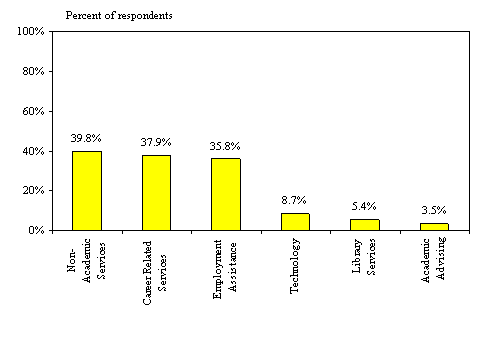
Satisfaction with Services
Respondents were asked to rate their satisfaction with the quality of each service using the previously discussed scale. The student services items were categorized into two areas: academic and non-academic. This section discusses each of these areas.
Academic Services
Library services received the highest overall rating, with 93% of respondents indicating that library services were "good" or "excellent". At least 80% of the respondents felt that overall technology services, career-related counseling services, and the employment search assistance were "excellent" or "good". The lowest overall satisfaction ratings were received for academic advising in majors (73%). The results of each of the academic services are presented in Chart 2.
Chart 2: Academic Areas Overall
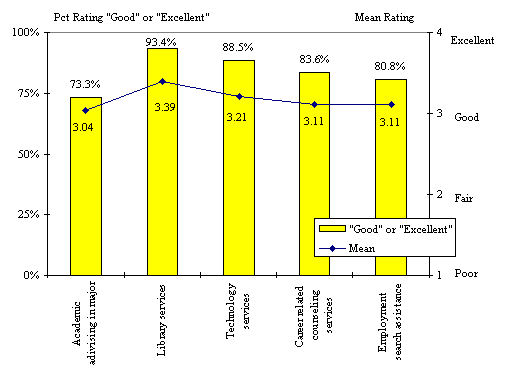
For most of the academic service items, analysis by gender, ethnicity, and academic units differed significantly where noted:
Chart 3: Academic Advising in Major
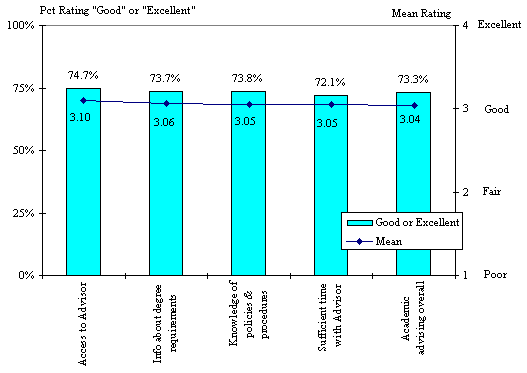
Chart 4: Library Services
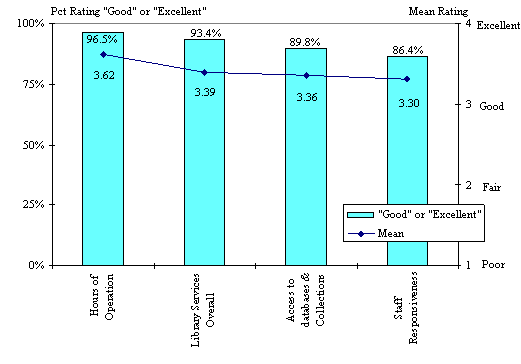
Chart 5: Technology Services
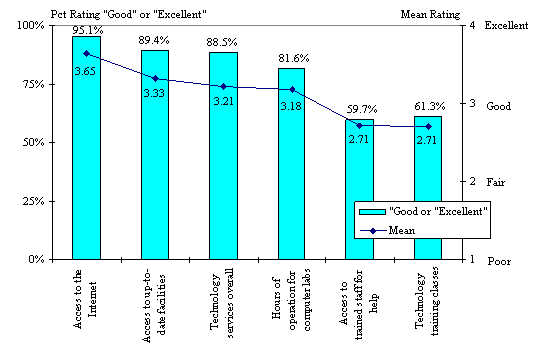
Chart 6: Career Related Services
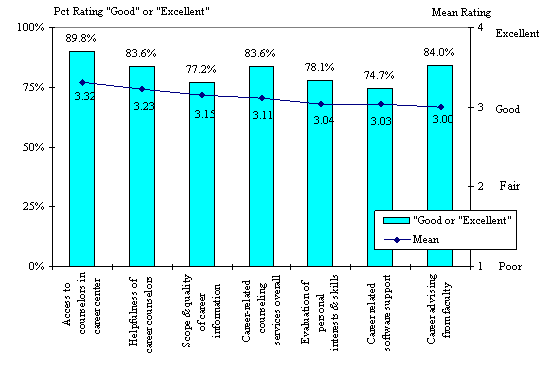
Chart 7: Employment Search Assistance
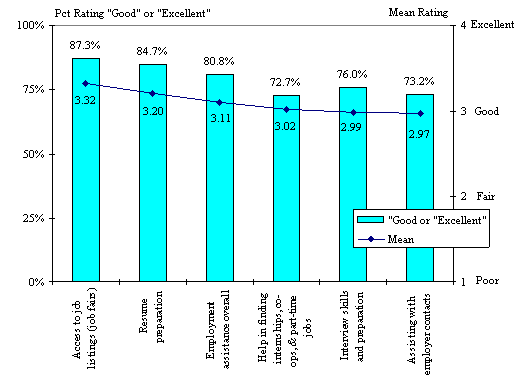
The open-ended questions on the survey asked two questions of the students:
1) what were the three most important things NC State could do to improve the quality of undergraduates� experiences here, and 2) to share any general comments they may have about their experiences at NC State or explain why they were particularly satisfied/dissatisfied with any aspect of their education at NC State. Academic Advising was a major concern among students answering the open-ended questions. Many students expressed the fact that their advisors were not aware of curriculum requirements and they felt as if their advisor really didn�t want the job of advising. One student stated that "advising could have been a lot better-maybe it was because I had three different advisors. Respondents did not seem to be particularly interested in my career objectives nor did they give me advice in what things I should be doing or pursuing. I feel I had to find out a lot of things on my own, when a good advisor could have helped me". Another student states that "advisors don�t care about where students are going or what they are doing. They don�t keep up with requirements (even in their own major). They do nothing for career planning, etc." Another student recommends that "maybe it would be a good idea to have an office where senior students can get credit for advising and tutoring." Students also felt that freshmen advisement was extremely important. Many indicated the need for better orientation on policies, more in-depth counseling about majors, and better guidance. There were some students who also expressed concern about the computer facilities. Students expressed the need for better computer facilities, and for labs to be open 24 hours.
Non-Academic Services
Respondents were also asked to rate their satisfaction with non-academic services such as residence halls, financial aid, and campus food services. These ratings were lower when compared with the academic services. At least 80% of respondents felt that recreational opportunities, leadership skills, and the registration process were "excellent" or "good." The lowest satisfaction rating was for campus food services (45%). There was one significant difference by academic unit: fewer Design students indicated that any of their experiences with Business Services/Cashier was positive.
Chart 8: Non-Academic Services
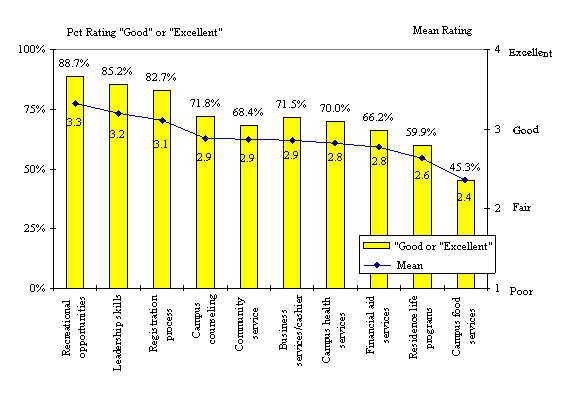
In addition to rating their satisfaction with the non-academic services, respondents were also asked to rate how responsive the staffs were in each of these units. Over 80% of respondents felt that the registration staff was "excellent" or "good". The campus food services staff received the lowest staff responsiveness ratings (49%). There were no significant differences by ethnicity or gender. There was one significant difference by academic unit: fewer Design students indicated that their experiences with the registration staff were positive.
Chart 9: Non-Academic Staff Responsiveness
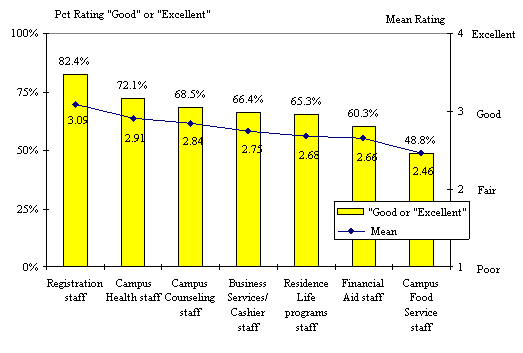
There were several open-ended responses concerning extra-curricular activities. Generally the recommendations were that there should be a better way of informing students about what is going on around campus. Most of the respondents indicated that they thoroughly enjoyed the extra-curricular activities. One student stated that "my extra-curricular activities have given me incredible experiences in leadership and teamwork. Support and interaction between campus and extra-curricular activities will be a de-stressor to students." A few students also suggested more interracial, multicultural, and student/faculty activities.
Several students responded that they were generally happy with services such as employment services and career services. One student stated that "I got in a lot of trouble but the services provided at NCSU helped me through the tough times with alcohol, drugs, and my getting in trouble." Several students expressed concerns about residence halls without air conditioning, the parking situation, and campus food services.
 Tables by Gender/Ethnicity
Tables by Gender/Ethnicity
 Tables by Academic Unit
Tables by Academic Unit